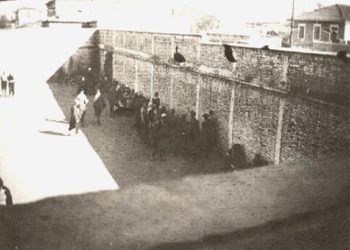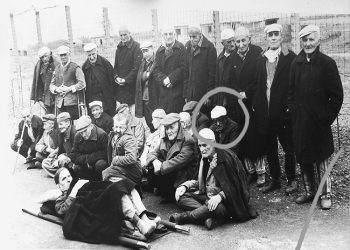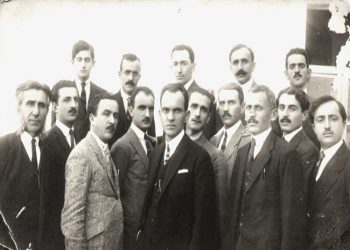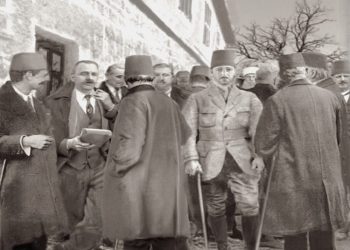Part Two
Memorie.al / The elders knew Hafiz Musa Dërguti well, that cleric (Hoxha) honored by all, distinguished for his deep devotion-that cleric who was always near that in need, near the troubles and concerns of the people. Wherever there was a difficulty, wherever there was a disagreement in the families of Shkodra and the surrounding villages, Hafiz Musa would be found, with his word, with his goodwill and his authority, to calm wounded hearts, to extinguish burning blood feuds, to reconcile and bring closer brother to brother, husband to wife, family to family, clan to clan. And all this he did for the sake of God, sacrificing his precious time, regardless of fatigue and toil, and rarely, facing expenses that were often heavy.
Continued from the previous issue
The stay in the investigation is also discussed in an article in the newspaper “Balli i Kombit.” After many months of torture, they sent him to be judged in the people’s court. “Many months later, powerless, with tears in their eyes, we saw them pass through a shouting, angry crowd, shackled two by two. There were 39 people, and among them were the Franciscan Father Gjon Shllaku, seminarians Mark Çuni and Gjon Shllaku, Professor Gjelosh Luli, and Hafiz Dërguti, a Muslim leader.”
Following a staged trial with false accusations, the Military Court of the Shkodra District declared him guilty of the “Crime as an enemy of the people, articles 2 and 3, law 372.” According to the Judicial Status Register of the Ministry of Justice, in Protocol number 7596 it is emphasized that; “For the so-called Musa Dërguti, son of Ethem and Meleqe, born in Shkodra, with decision No. 463, dated 27.11.1947, the Shkodra Military Court declared him guilty of the crime as an enemy of the people, articles 2 and 3 of law 372, sentenced to 10 (ten) years of deprivation of liberty and the removal of Civil Rights.”
Furthermore, in another document issued by the Ministry of Public Order, Directorate of Prison Administration, it is emphasized that; “Mr. Musa Ethem Dërguti, born in 1888, based on the fundamental register No. 1, with serial number 5264, was arrested on 11.09.1946 and released on 8.11.1956.”
From these two documents, we emphasize that, despite our efforts to become acquainted with the judicial file and the investigative file of Hafiz Musa Dërguti, it was not possible, because the Shkodra District Court refused to make them available to us. “We understand that Hafiz Musa Dërguti was arrested on September 11, 1946, the day after the Postriba Uprising, was tried on November 27, 1947, and was held in investigation for one year, two months, and 16 days.
Thus, from September 11, 1946, until November 27, 1947, this honored cleric, completely innocent, was tortured in the dungeons of the State Security, only to be declared an enemy of the people and sentenced to 15 years by the Prosecutor’s indictment, and to receive the decision from the judicial body, led by Aranit Çela, for 10 years of deprivation of liberty and the removal of civil rights.
It should be emphasized that Hafiz Dërguti did not benefit from any kind of amnesty and served all the years of the sentence in full, even doing two months more in prison than the ten years of the sentence. And all this, in the infamous Burrel prison. He, apparently, was a very dangerous enemy of the people (read: the communist regime).
We wish to emphasize that when Hafiz Musa Dërguti was arrested, he was 56 years old and left prison over 66 years old, a tired old man. Hafiz Musa Dërguti was convicted based on communist laws and was labeled an enemy of the people, while his entire activity, throughout his life, proves very clearly that he was a friend to all, a propagandist of peace, kindness, mercy, devotion, a man capable of being close to people in their troubles and family concerns, in their worries and disagreements that life brings every day.
He was always a close friend of every family, of every person in need, with his wise word, with his authority and devotion; he was a friend of the people, and he was an outstanding patriot. But what did the communist military court care about these things? With the sword of class warfare, it made no distinctions, it wanted terror, and it did not spare it against anyone, regardless of any person, any fact, no matter how meaningful it was. Thus, Hafiz Dërguti was initially taken to the Great Prison and then to Burrel prison.
Regarding his miserable life in these prisons, and the suffering he endured for ten years in those horrifying dungeons, witnesses speak in only one direction, emphasizing only one fact: “Hafiz Musa Dërguti never complained, he did not lose his faith in the bright day of freedom at all, he was an optimist and with this optimism, he inspired everyone.”
Ruzhdi Çoba concludes his memoirs with these words: “This was Hafiz Musa Dërguti, whom I knew personally. Patient. When he learned that his family had been interned, a thing that caused him great pain, he prayed to God day and night. In fact, he spent many years in prison, but he was never sad, he always gave courage and hope, especially to the young people. Always optimistic, optimistic, optimistic, even though he was elderly.”
To show Hafiz Dërguti’s deep faith and optimism, we quote a fragment from the article by Mr. Beqir Ajazi: “Once I woke up very early. According to the changing of the guards, I realized it was 3 AM. I was quite upset, as I knew that once I woke up, sleep would permanently flee from me and give way to worries and pains for which there was no balm to soothe. At this time, I noticed that the Hafiz had opened his eyes. Completely absorbed in my troubles, I momentarily forgot the respect I owed him and thus dared to say to him: ‘Efendi, do you think perhaps there was no God at all, and we wasted our lives for nothing, giving communism a chance to devour us like pigeons?’ With this question, I was not expecting a theological lecture from him, but only some sort of comfort, just to calm my weary soul a little. I saw that he got angry with me, raised his head from the pillow, and with those brightly shining eyes, raising his index finger in a threatening manner, he began to speak to me with anger: ‘Do you know how old I am?! How many years in prison I have done and how many I have left to do? And do you really think that Hafiz Musa will complete all these years and get out and go home alive?’
-‘No, actually no.’
-‘Well, look here; listen carefully to these words, for you will never hear them from my mouth again. If Hafiz Musa Dërguti dies in prison, then rest easy and without any fear, that there is no God at all, but if Musa gets out of prison and goes and dies in his own home, then be sure that there is a God who regulates the entire globe in full harmony. This suffering we are enduring is nothing but a level of spiritual elevation that God has set for us to lead us towards perfection.’
Having finished these words, he put his head back on the pillow and entered that phase where only his lips were seen moving, and only God knew if he was sleeping or praying to Him. Not even two years had passed well since my release from Burrel prison, when one day someone knocked on the door of my house. It was the postman who handed me a telegram. I opened it with some surprise, because I had never received a letter or telegram from anyone since I got out of prison.
-‘Hafiz Musa is home and is waiting for you. The Family.’
I couldn’t believe my eyes. It seemed completely impossible. Moreover, to make sure I wasn’t in a dream daze, I gave it to someone to read it to me…! Only then did the words Musa Dërguti had told me that night come to mind…! The meaning of this telegram meant: ‘Do you see and understand the proof I gave you once, that THERE IS ONE GOD WHO IS UNIQUE AND UNRIVALED’?!”
Hafiz Dërguti’s optimism, his faith in life, his belief in its continuity, can be seen quite clearly in this conversation that we note below, recounted by Father Zef Pllumi, in the Great Prison of Shkodra. The Hafiz, seeing a young man in the seminarian, even in the dark circumstances of the communist prisons, has his mind on life, on its continuation, on its natural flow, on engagement and marriage, and therefore, in confidence and with the goodwill that characterized him, he says: “Do you know, Zef, that all these nights, in this chaos in our room, the night is passing without sleep and I have thought about you…?!
Look, from what I know, you are not a priest, like these others. Therefore, thinking to myself, all night without sleep, I said: There is a girl who is exactly a fairy. I know her. Beautiful… so much so! She has wavy blonde hair that falls behind her down to her waist. Oh God, truly a fairy. She is from a good house. She is entitled to two houses (as inheritance). Look, when she comes to meet me, I will send word to her about you. Don’t tell me no. I guarantee everything. God has created nothing more beautiful and better than marriage. Is honey good and sweet? Well, it doesn’t come close to a good wife! If God grants you a good, beautiful, pure wife, your life becomes paradise. That girl I’m thinking of is truly a fairy…!'”
The high moral qualities and manhood of Hafiz Dërguti clearly emerge in the difficult conditions of prison life. All those who had the misfortune of spending years in these prisons alongside him emphasize that he was kind-hearted, always near those in need, a high example of resilience. He would take the food out of his own mouth to share it with others.
Tom Lec Marku calls him a “Dai (one who gives) for everyone, he gave whatever he had to whoever needed it,” while Beqir Ajazi writes: “I served near him for 40 months and that many times I distributed, God knows how much sugar, oil, rice, cheese, etc., to the miserable inmates of the cellblock, not to mention the cooked meals, which were bought so expensively and transported from Shkodra to Burrel with so much effort and sacrifice.”
From the food his family sent him, he only kept the olives, which he ate, and distributed all the rest to the needy who had no help from family members. Hafiz Dërguti was a learned cleric who made no concessions on matters of the Islamic faith and Sharia law, but despite this, he was tolerant, preaching peace and understanding among people, among believers of different faiths.
Father Zef Pllumi, among other things, writes: “…The cleric was not only very tolerant but also very kind-hearted…!” “…he respected us (this is when referring to all the Catholic clerics in the prison cell, where Hafiz Dërguti also lived. Our note), and for this he had the esteem and love of all of us. He was a handsome and very sincere old man; he told us that all his life, he had shown sympathy for the Catholic Clergy…!”
And further down, Father Zefi writes: “Hafiz Dërguti was very devout, but not fanatical…!” Recalling prison life, Father Zefi emphasizes a very interesting episode: “Not many days passed, and unexpectedly, the door of our cell opened. A senior officer came in…! He asked us each for our names.
-‘All priests?’
-‘Yes, all of us.’
-‘Do you see what revolution means? Until now, the laws of the bourgeoisie considered the priest untouchable, while now we bring even God here, accompanied by two police. This is the power of the Party. But you, Hoxhë Efendi,’ he turned to Hafiz Dërguti, ‘what are you doing here?’
-‘I too, like the other clerics.’
-‘No, Hoxhë Efendi, until now you have taught us that it is a merit (sevap) to kill the ‘kaurr’ (infidel/non-believer), and now how do you spend your time with the priests?!’
-‘I get along very well with them,’ the cleric replied. ‘We are the servants of God. As for those teachings you are mentioning, that is false testimony: I never taught that in mejtep (religious school), as you say!’
-‘Even if it wasn’t you personally,’ the officer said, ‘it was another cleric, just like you: with this beautiful white beard.’
–‘That changes the game,’ the Hafiz replied. ‘I am me, and that other is another. If there was a cleric who taught you to kill kaurrs, I will tell you frankly, that he must have been an hoxhë xhahil (ignorant cleric) and not an hoxhë halim (wise/forbearing cleric)’!”
Hafiz Dërguti was a devout believer. Even in the difficult conditions of the prison, he performed all religious rites. He not only prayed the five daily prayers but also fasted during Ramadan. With his example, but also as a result of Hafiz Dërguti’s work, I can say with full conviction that in the three years I was there, no Muslim failed to fast during Ramadan…”!
Regarding his will and conviction toward Islamic religious observances (ibadah), we bring another meaningful example, brought to us in the memoirs of Mr. Ruzhdi Çoba. “The Hafiz fell ill with adenitis. Not only he, but also the other prisoners were worried and asked his family to provide streptomycin to cure the disease.
The medicines arrived when Ramadan had already begun for Muslim believers. Even though the Quran allows the Muslim believer not too fast for reasons of illness, the Hafiz refused to be treated but continued, deeply convinced, not to break the fast of Ramadan.
After 30 days, to everyone’s surprise, Hafiz Dërguti no longer needed treatment; he had fully recovered from the disease. Mr. Ruzhdiu explains this as a miracle of the Almighty. But we would also add another psychological factor that seems very important to us. Medicines have their role in treating diseases, but a person’s conviction about duty, their dedication, and their spiritual state are, in many cases, much stronger than any medication.
And Hafiz Dërguti faced the disease with his will, his patience, his dedication, and deep conviction toward the great God, with his devotion to the Islamic duty. This is a medicine more powerful than any medication. He had faith in life, he never succumbed to the miseries of the prison, and he never lost hope. He had leaned on the great and merciful God.
And who else could have managed to save so many prisoners who went through inhuman tortures, who lived in dark and damp cells, in the bitter cold, who were plunged into the black mud of the swamps, among blood-sucking leeches, in exhausting work, without food, without ever filling their stomachs with bread, and without sleep, except for faith in life, except for reliance on the mercy of the great God?
Hafiz Dërguti was as beloved and compassionate as he was proud, brave, and manly. With his work, his behavior, and his words, he always proved this, not only by taking up arms to protect the country in difficult moments but at every moment, he knew how to behave and act to preserve his dignity, that of his family, or of the friends with whom life had connected him.
From prison life, they recount a meaningful incident, when Hafiz Dërguti, feeling insulted by the behavior of a police officer, without any fear of the consequences, grabbed the water jug and struck the officer’s head with all his strength.
The folk rhapsodist Dedë Shyti describes this event in the following verses:
“The police tried to obstruct,
To keep the Hafiz from performing his rite…
The faithless dogs interrupted his prayer,
He hit the police officer, pot on the head!”
Life in communist prisons for every political prisoner was accompanied by deep spiritual suffering over the fate of their family, which underwent multiple persecutions and mistreatments. The arrest brought not only Hafiz a life full of suffering and torture, but for his family, a real calvary began.
On April 5, 1949, his entire family was arrested and placed in the Shkodra prison. They were not held long in Shkodra and were interned in Berat, later sent to Tepelena, Lozhan in Korça, and then isolated in the Castle of Porto Palermo. Later they were sent to Tepelena, Skrapar, Lushnje.
And after four years, his wife was finally released, while Hafiz Dërguti’s youngest son, Sabriu, was released after eight years. The Hafiz’s two older sons, Fejziu and Hamiti, fled in the very first days, while the third son, Eqerem, was held in prison for another four years.
Prison, escape, unemployment, political and economic discrimination, the denial of schooling for children, repeated public denunciations in the neighborhood as “dangerous enemies,” were the shackles that bound the family of Hafiz Musa Dërguti, himself, his wife, children, grandchildren, and granddaughters ever tighter during the communist rule.
And, think of the poor old man, whom to mourn first—his own troubles under torture and the miseries of prisons, or his wife and children scattered to all the most remote corners of the country, fed and unfed, sheltered and unsheltered, with no place to rest, and from one prison to another, from one camp to another.
And yet, Hafiz Musa Dërguti and his family survived. Their honor, dignity, and pride were not defeated. They endured this multiple persecution with dignity, with deep faith in the glorious God, with tireless work, thus earning the respect of the entire city.
They may have suffered even for a bite to eat, they may have done the hardest work, they may have lost the right to studies, like many other peers, but they preserved their honor and dignity deeply, they never lost faith in God, so, in this way, they survived.
The release from prison on 8.11.1956 was a joyful event for Hafiz Musa himself, now old and tired from long suffering, for his entire family, relatives, and all friends and well-wishers. His house did not stop, welcoming and seeing off friends who came to congratulate him, despite the caution and perpetual fear instilled by the communist persecution.
Hafiz Dërguti died on March 15, 1961. The funeral procession was a challenge to the communist dictatorship. The citizens of Shkodra, clerics of both faiths, villagers from the surrounding areas, and many friends and prison mates, accompanied him with tears in their eyes. They thus expressed their deep pain and special respect for this worthy son of Albania, for this honored cleric.
Hafiz Musa Dërguti remains in our memory as an outstanding personality of Islamic culture, as a devout cleric, as a patriot, a determined democrat and anti-communist, as an honored citizen, as an example of peace, understanding, and tolerance among people.
Even today, many of his expressions and thoughts are preserved in popular memory, such as: “Do good in this life,” “What you can do, don’t leave it undone,” “Try to help others, not only when they are poor, but also when they fall into misfortune and have life’s troubles.” These moral lessons of daily life, by which he was guided, made Hafiz Musa Dërguti a “People’s Judge”! Memorie.al
Taken from the book; “In Memory of Generations,” by the authors; Fak LULI, (Dr. Honoris Causa) “Teacher of the Nation,” Islam Dizdari, Nexhmi Bushati.




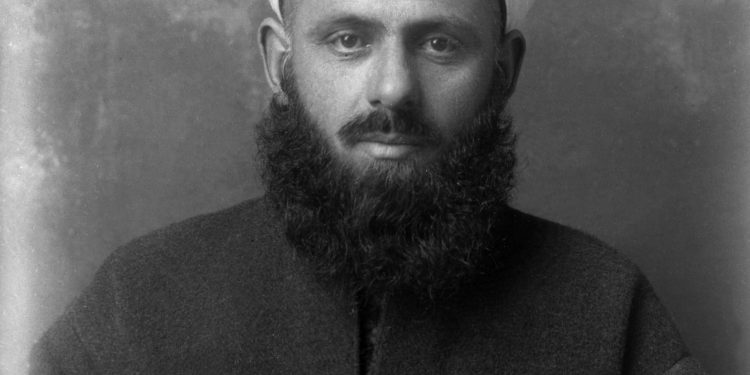
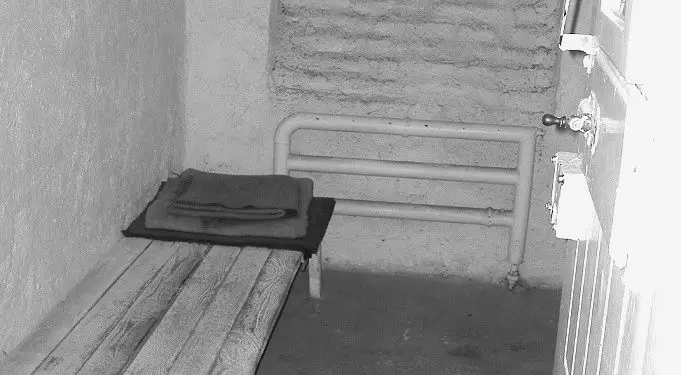
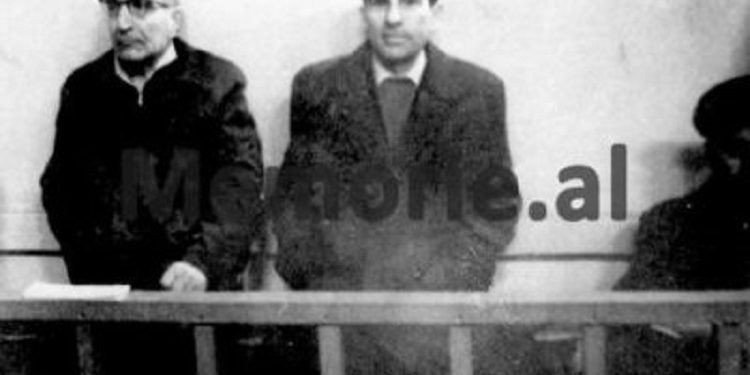
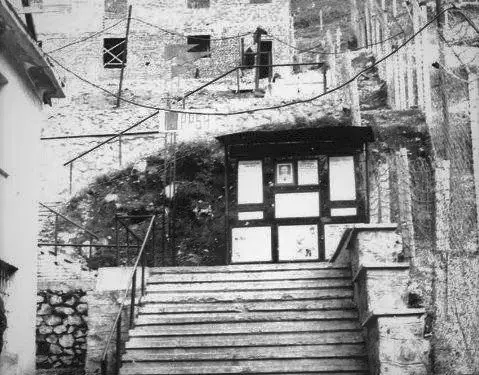
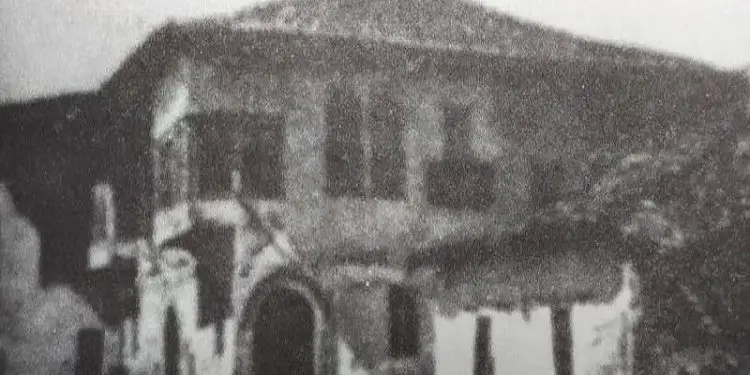
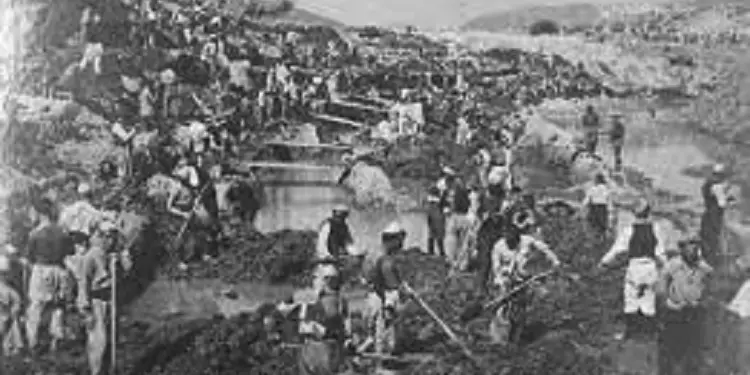
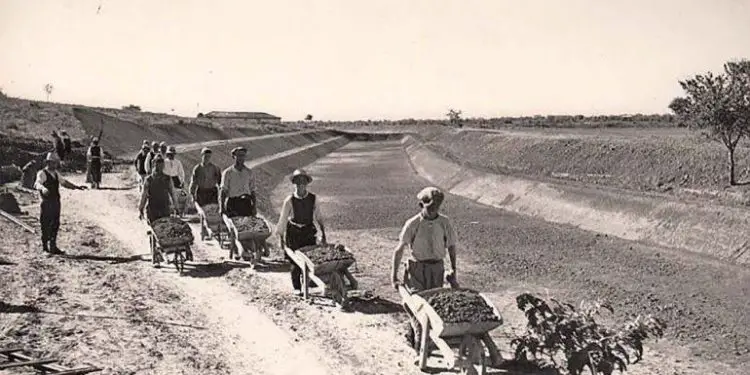
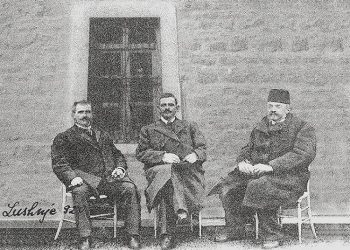
![“Light imprisonment may be served in a workhouse or by performing labor for public benefit; and if the convict does not display [bad behavior/resistance]…” / What did the Penal Code of 1928 provide?](https://memorie.al/wp-content/uploads/2025/03/admin-ajax-1-350x250.jpg)
